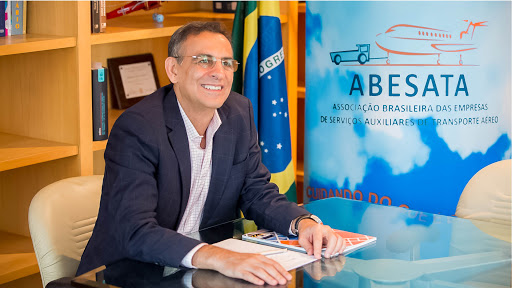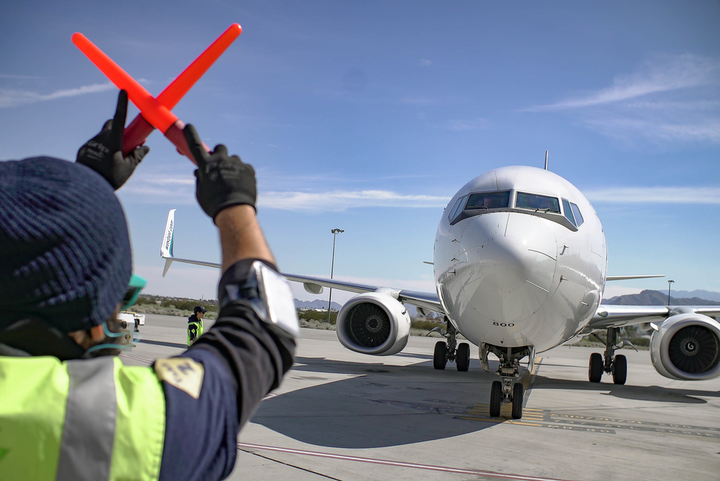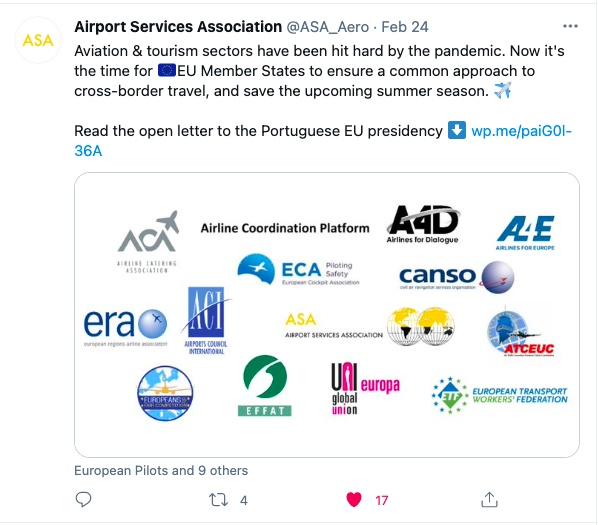Share this news on:
Newsletter - April 2021
Published on: 30 April 2021ASA'S MESSAGE OF THE MONTH
Since the beginning of the COVID-19 crisis, air cargo has been a vital partner in delivering much-needed medicines, medical equipment, e-commerce goods and in keeping global supply chains functioning for the most time-sensitive materials. This has been done through dedicated cargo freighter operations, use of cargo capacity in passenger aircraft, and relief flights to affected areas. We can well and truly say that cargo was the success story of the aviation industry.
This was also possible thanks to the smooth operation at our airports and the quick adaptation to COVID health and safety guidelines. The
ground handling community played a key part in connecting people and regions worldwide.
Whilst the future remains uncertain, we must continue to uphold the highest safety guidelines, whilst satisfying our customers and facilitating transit of passengers and cargo in our airports. That's why we have started looking into a dedicated ASA Cargo Committee, to identify ways in which we can support our Members' cargo activities. We will inform you of further developments.
Best regards,
Fabio Gamba
MONTHLY REGIONAL INTERVIEW - Brazil

In 2020, the air transport sector in Brazil was growing, with more and more people travelling. At the onset of the pandemic, Brazil counted around 40,000 ground handling workers. Ricardo Miguel, CEO of Abesata, talks to ASA about how the pandemic hit the country and his vision for the
future. Abesata is an association that was born in 2013 to bring together ground handling services in Brazil.
What was the state of the industry before the pandemic? How was Brazil’s ground handling sector affected?
Brazil was seeing an increasing number of air passengers, despite the economic crisis. People who had never entered an airport were now flying. When the pandemic hit, the Brazilian government was determined that the air travel industry should not be impacted. The Ministry of Economy decided to support the sector with a credit line, but it was unfortunately unsuccessful. The idea was that the Federal Government would bear 80% of the risk and 20% would lie with private banks. But data was already showing that air transport was the second sector hardest hit by the crisis. Private banks chose to finance other areas of the economy with lower risks. ABESATA was in contact with the Federal bodies to modify this model of bank loans for 2021.
ABESATA worked with airlines, to underline the importance of ground handling and the necessity to prioritise payments to these companies. The aerodrome administrators such as the state-owned Infraero and private concessionaires understood that easily. They prioritised this segment because they saw that this could be harmful for the resumption of transport.
But the difficulties for the sector are not over. In a labour-intensive activity, how will the companies survive?
Is there an estimate of when the sector will recover?
Brazil is continental, it is driven by domestic transport. Unlike some countries, you cannot easily reach certain locations without air transport. Because of domestic demand, we started seeing resumption of air travel as early as November 2020. By December 2020, we were back to 70% of 2019 numbers. The ground handling companies started to rehire. However, from March 2021, with the new variant and the increase in the number of cases, we saw about 40% of flights scheduled for April being cancelled. The industry suffered great shock as it had already started to rehire for the holiday demand. We saw a new wave of lay-offs.
What is needed now is mass vaccination. A study by the Brazilian Association of Airline Companies (Abear) says it is necessary to vaccinate 80 million people in Brazil (less than half the population) if we want travel resumption. Thanks to the nation production of vaccines, we expect air transport to resume in June and predict that we can reach pre-COVID levels as early as September.
Take 2 minutes to complete the ASA barometer.
This two-minute survey is for managers in the global ground handling industry. After a tough year for the industry, and continued lack of government support, it is time to act for change. We would like to gather data and insights from leading voices in the ground handling industry to help drive our conversation with governments and regulators. We would like to thank you for your time when completing this survey. If you have any questions, please contact Bianca Amorim at b.amorim@eoipsocommunications.com.
This survey will close on the 10th of May 2021.
Take the survey
IN THE MEDIA: SOLUTIONS FOR CONGESTION
aviationpros.com, February 18, 2021

Constraints on the airport ramp can be a nuisance for ground service personnel. Crowded aprons and parking stands as well as the layouts of terminals and gates can create challenges for ground handlers working to safely turnaround aircraft in an efficient manner. “Airports have been designed without taking
too much into consideration the operational needs of those who would want to use this runway and the airport, itself", Fabio Gamba, director general at ASA.
As a result, ground service providers must often navigate several operational hurdles. To make their tasks more manageable, ground handlers can work with airports and airlines to ensure new designs are optimized to enable smooth ground service. And until those design projects are underway, ground service providers can address their equipment needs to work within existing constraints.
ASA ON SOCIAL MEDIA

This month ASA was represented at...
The ACI World & Safety Technical Committee (presentation given by Fabio Gamba, on 31 March 2021)
The EASA Aerodromes Technical Committee, ADR.TEC (attended by Fabio Gamba, on 14 April 2021)
The ICAO Ground Handling Webinar for the SAM region (presentation given by Fabio Gamba, on 21 April 2021)
The EASA Aerodromes Technical Body Meeting, ADR.TeB (to be attended by Fabio Gamba, on 5 May 2021)
Do you want to contribute to our next edition, by sharing your news, contents or announcements? Please email b.amorim@eoipsocommunications.com.
OUR ANNOUNCEMENTS
WE WELCOME THE NEW CHAIRMAN: Atilla Korkmazoğlu

Earlier this month, we announced the arrival of our new chairman Atilla Korkmazoglu, taking over from Steve Allen. Atilla brings almost 30 years of experience in the ground handling services field, spanning operational and executive positions. We wish Atilla all the best in the new position and we would like to thank Steve for all his hard work and dedication in the past few years.
LAUFER AVIATION GHI: CEO Announcement
In February, Laufer Aviation GHI announced the nomination of its new CEO, Mr. Lior Sagie. Mr. Sagie established the UPS operation in Israel and served as their CEO for 24 years. We wish Mr. Sagie all the best in his new role.
UPCOMING: ASA Global Round Table
This summer, ASA is launching its very own webinar series this summer: the ASA Global Round Table. Held online, this series of talks will cover the ground handling industry's most important topics, and we will welcome thought-leaders from across the sector to hear about their visions for the future.
The Round Table will be moderated by Oliver Aust, former Head of Communications at easyJet, and we hope to see as many managers and senior staff from across the industry attending. Our first session will take place in June, to talk about: Cargo - the success story of the pandemic?
Stay tuned for more info!